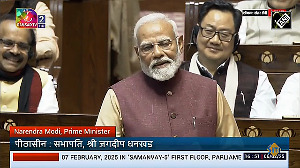Expressing surprise over the reports that China was planning to lift its ban on trade in tiger parts, India has sought clarification from a United Nations forum in which China a few days ago had pledged to the contrary.
"We have seen the reports from Beijing, which is surprising, but any way they have not come from a very high official, so we have sought clarifications from Convention on International Trade in Endangered Species," a senior official of the National Tiger Conservation Authority told UNI.
The official had attended the recently-concluded meeting of CITES at the Hague at which India had scored a major victory by securing unanimous passage of a resolution saying that the trade ban should continue and that captive breeding of tigers be allowed only to the extent it is supportive of conserving tigers in the wild.
It had clearly said tigers would not be bred for trade in their parts.
Though China had initially opposed the resolution, it had to finally fall in line in view of overwhelming international opinion against lifting of the ban.
China wanted to breed tiger in captivity to undo a 14-year trade in tiger parts.
The CITES resolution had come as great victory for India which has been lobbying with other members to ensure that China's bid to to open trade in tiger derivatives was foiled.
China is reported to have several thousand captive-bred tigers and less than 30 in the wild.
Now, the news from Beijing has come as a surprise. A Chinese wildlife official told state media that his country may eventually lift its 14-year ban on the trade of tiger bones and body parts.
"The ban is in place, but it is open for review. The ban won't be there forever, given the strong voices from tiger farmers, experts and society," said reports quoting Wang Wei, wildlife deputy director at the state forestry administration.
In China, there is an intense pressure from companies seeking to meet local demand for tiger bones and parts in traditional Chinese medicine.
According to China's stand, the authorised and captive breeding may help the cause of conservation, as it would prevent people from taking the risk of poaching.
However, India and wildlife experts say that lifting ban in trade in tiger parts will result in steep increase in demand, leading to increased paoching of wild tigers.






 © 2025
© 2025